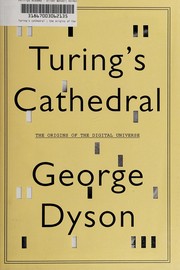Check nearby libraries
Buy this book

"Legendary historian and philosopher of science George Dyson vividly re-creates the scenes of focused experimentation, incredible mathematical insight, and pure creative genius that gave us computers, digital television, modern genetics, models of stellar evolution--in other words, computer code. In the 1940s and '50s, a group of eccentric geniuses--led by John von Neumann--gathered at the newly created Institute for Advanced Study in Princeton, New Jersey. Their joint project was the realization of the theoretical universal machine, an idea that had been put forth by mathematician Alan Turing. This group of brilliant engineers worked in isolation, almost entirely independent from industry and the traditional academic community. But because they relied exclusively on government funding, the government wanted its share of the results: the computer that they built also led directly to the hydrogen bomb. George Dyson has uncovered a wealth of new material about this project, and in bringing the story of these men and women and their ideas to life, he shows how the crucial advancements that dominated twentieth-century technology emerged from one computer in one laboratory, where the digital universe as we know it was born"--
"Legendary historian and philosopher of science George Dyson vividly re-creates the scenes of focused experimentation, incredible mathematical insight, and pure creative genius that gave us computers, digital television, modern genetics, models of stellar evolution--in other words, computer code"--
Check nearby libraries
Buy this book

Previews available in: English
Subjects
BIOGRAPHY & AUTOBIOGRAPHY / Science & Technology, SCIENCE / General, Computable functions, Turing machines, Random access memory, Computers, History, Long Now Manual for Civilization, Informatique, SCIENCE (Programme), SCIENCE, Science & Technology, Histoire, Programmation informatique, General, Science et technologie, Ordinateurs, BIOGRAPHY & AUTOBIOGRAPHYPlaces
Princeton, Welwyn Garden, Oxford| Edition | Availability |
|---|---|
|
1
Turing's cathedral: the origins of the digital universe
2012, Pantheon Books
in English
0375422773 9780375422775
|
aaaa
|
|
2
Turing's cathedral: The Origins of the Digital Universe
2012, Penguin
eBook
in English
0375422773 9780375422775
|
zzzz
|
Book Details
Edition Notes
Includes index.
Classifications
The Physical Object
ID Numbers
Source records
Library of Congress MARC recordLibrary of Congress MARC record
Library of Congress MARC record
marc_openlibraries_phillipsacademy MARC record
marc_openlibraries_sanfranciscopubliclibrary MARC record
Internet Archive item record
Marygrove College MARC record
Library of Congress MARC record
Promise Item
harvard_bibliographic_metadata record
marc_columbia MARC record
Work Description
Legendary historian and philosopher of science George Dyson vividly re-creates the scenes of focused experimentation, incredible mathematical insight, and pure creative genius that gave us computers, digital television, modern genetics, models of stellar evolution--in other words, computer code. In the 1940s and '50s, a group of eccentric geniuses--led by John von Neumann--gathered at the newly created Institute for Advanced Study in Princeton, New Jersey. Their joint project was the realization of the theoretical universal machine, an idea that had been put forth by mathematician Alan Turing. This group of brilliant engineers worked in isolation, almost entirely independent from industry and the traditional academic community. But because they relied exclusively on government funding, the government wanted its share of the results: the computer that they built also led directly to the hydrogen bomb. George Dyson has uncovered a wealth of new material about this project, and in bringing the story of these men and women and their ideas to life, he shows how the crucial advancements that dominated twentieth-century technology emerged from one computer in one laboratory, where the digital universe as we know it was born.
Community Reviews (0)
Feedback?| December 13, 2019 | Edited by MARC Bot | import existing book |
| October 4, 2017 | Edited by MARC Bot | adding to Long Now Manual for Civilization |
| April 18, 2013 | Edited by Kevin Beynon | Added new cover |
| April 18, 2013 | Edited by Kevin Beynon | Added description. |
| October 21, 2011 | Created by LC Bot | import new book |













